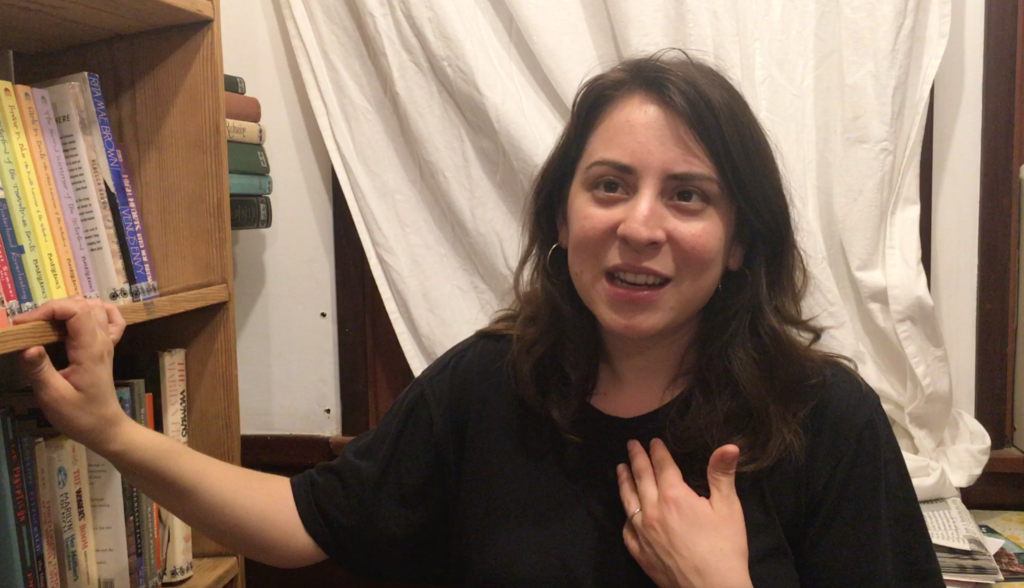
Comedian Rebecca Aranda used social media to organize the “Woman of Color in Comedy” showcase at the Women’s Center for Creative Work in Los Angeles.
Women of color often feel “tokenized” in Hollywood industries like comedy and acting. Rebecca Aranda, a Latina comedian based in Los Angeles, decided to try and tackle the problem. With her Facebook group “Women of Color in Comedy,” she organized a group of female performers of color and helped them create an emotionally-charged and wildly poignant showcase at the Women’s Center for Creative Work in Los Angeles.
MW: You started this whole “Women of Color in Comedy” showcase.
RA: I did.
MW: How did you have the idea? Tell me about the process.
RA: It all really started with Facebook. I’m in a lot of Facebook networking groups. I’m in a lot of things that are like, “Women in Comedy in Los Angeles,” or “Women in Comedy,” or “Women of UCB,” or they’ll be like, “LA Underground Network”—stuff like that, where its all about comedy or about being a woman, but I didn’t see anything about being a woman of color. And I knew a lot of funny women of color. And I was like, ‘There’s gotta be a group somewhere out there, right?’ And I searched! I searched for all the different keywords.
I couldn’t find anything that somebody could join as an easy, open resource for women of color to find each other and support each other in comedy. So, I posted in frustration on Facebook, and was like, “Are there any women of color in comedy groups on Facebook!? Because if not, I’m just gonna make it myself.”
I’m a Latina—I’m a very pale Latina—but I’m still a Latina! And I was like, “I can make the group, and other people can take it over. I don’t mind taking a backseat, because I am very very pale.” I don’t mind!
So I made the group, and I invited my friends, and had them invite their friends. All you have to do is search “Women of Color in Comedy” to find it.
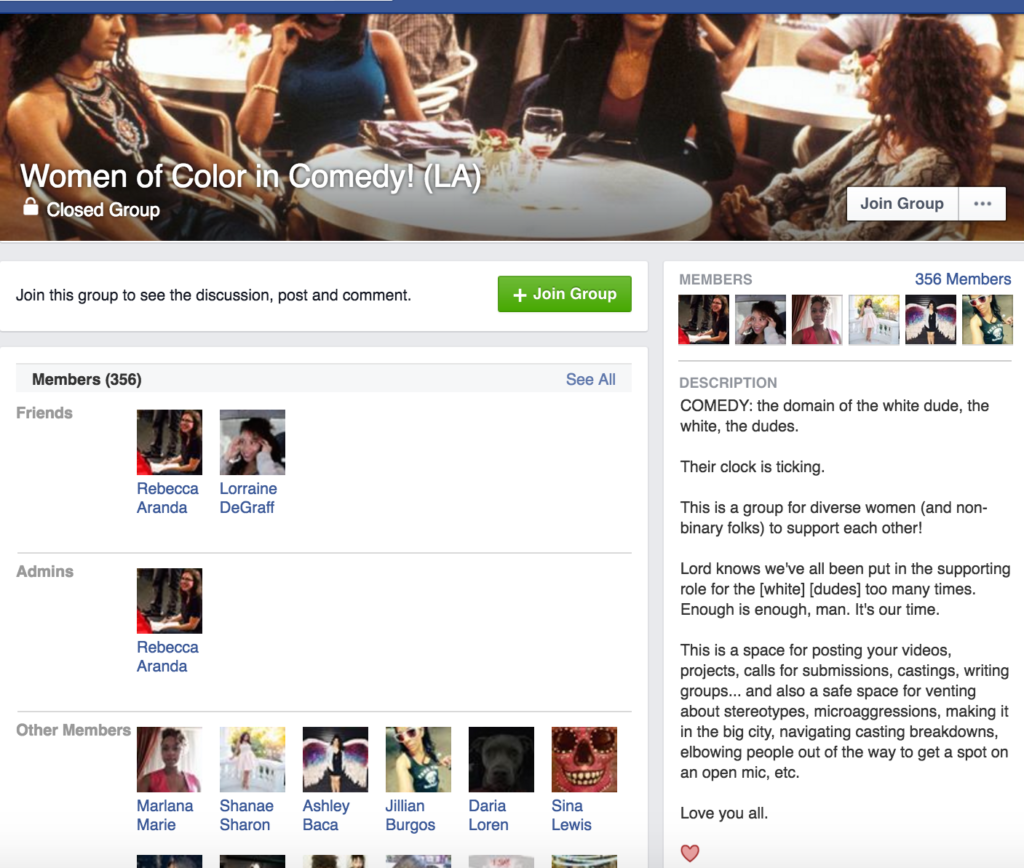
The Women of Color in Comedy Facebook group aims to provide a “safe space” for female funny ladies.
But, yeah, I was really excited because as the group grew, I could see that it was a resource that people had been really hungry for. There are so many women of color in comedy, but we feel so isolated. And I think it’s because the industry makes us feel isolated. They tokenize us. They will put like one Latina on a sketch group, or one black woman in an Improv group, or in a sitcom there’s like one person. But there’s never really any groups of women of color. I wanted to be part of that changing tide that moves it forward.
I posted just in my different groups—in my Facebook comedy groups—like “Hey I’m looking for women of color…I’m looking for people who are performers and writers,” and, ya know, “Hit me up! It can be a sketch show, it can be weird, performance art-y monologues. Anything you want to do, let’s do it! I just want to find people that I can showcase their talents.”
And then I found them! I got a lot of applicants, and then I picked these women off of just, like, intuition. And the first time that we met it was pretty cool and we just immediately connected. We immediately had so much stuff to get off our chest. When we met to rehearse, we had these conversations that felt more like group therapy than sketch writing.
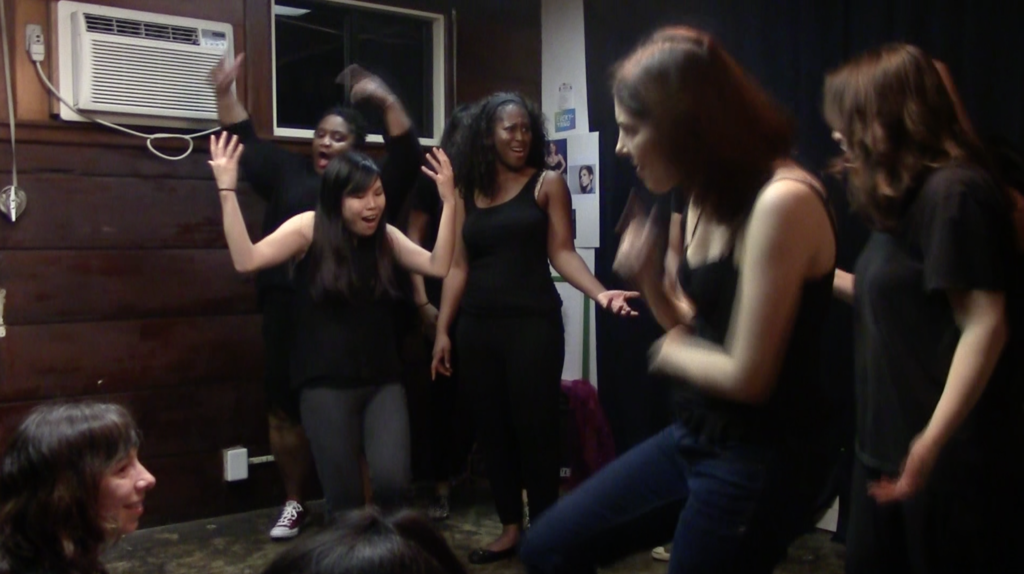
Monologues, musical comedy numbers, and sketch scenes defined the March showcase that assembled various performers of color.
The sketches that came out of it ended up being extremely therapeutic and new and original, it felt like. It wasn’t just comedy. We were also talking about the things that had hurt us, the things that we’re trying to heal from.
That’s the kind of stuff I want to see more of in comedy: just real, honest stuff. Cause we’ve seen the same old stuff over and over again!
MW: Were these the kinds of jokes and sketches that you always wanted to write but never felt you could?
RA: It was really cool to be in a room with a group of individuals where every single person was on the same page. Sometimes when you’re in a group—a comedy group—that’s been assembled through the different improv schools or sketch schools, or when you’re at a stand-up show or something, you’ll meet some people that are on your level but not everybody’s going to be on the same wavelength. So that was the main thing: just getting everybody on the same wavelength.
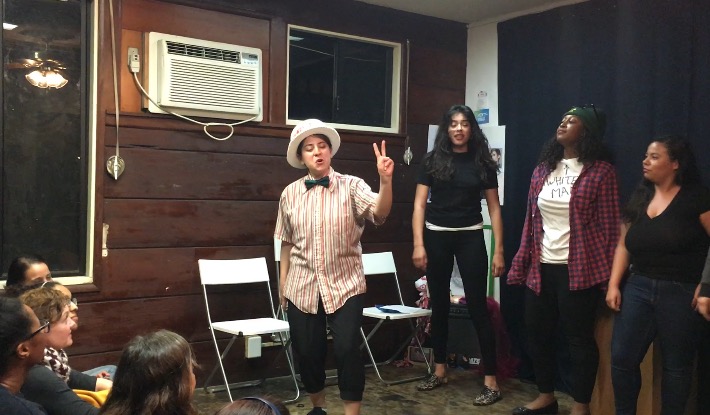
Rebecca Aranda lead the show’s finale number in a sexist-bashing parody to the tune of “Ya Got Trouble” from “The Music Man.”
I didn’t have that much to say, but I just knew that there were so many people who had things to say—I knew that there were so many women who had things to say. And were literally just not given the chance.
These are women who are, like, writing. They’re writing pilots, they’re doing stand-up, they are out there. They are busy. They’re putting themselves out there all the time. But the industry is not made for them yet. And so, it’s getting to the point where it’s like, if these opportunities aren’t being made for us, we need to make our own opportunities. So I’m really excited that we got to do this and I’m really excited that the response was so positive because I really want to do more of this.
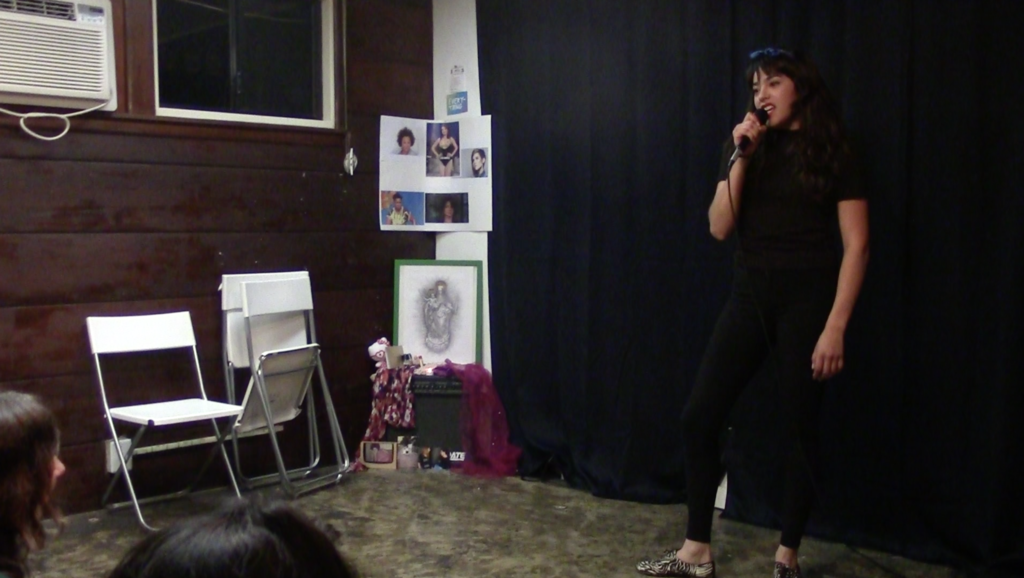
Comedian Jovita Trujillo performs stand-up for the first time in front of a live audience. She says she usually performs on Periscope– an app that provides a live feed to a worldwide audience.
MW: How much of a role did technology play and do you think this would have been possible without Facebook and social media?
RA: To be honest, the way that we did it, I’m not sure it would. And I was just thinking about that earlier this week, because the way that we wrote sketches was, we put everything on Google Drive, and any time we had to edit a sketch, any time we had a note about a sketch, we all had the Google Drive to access, and we could all access the sketches, and immediately edit it, immediately change it, immediately be able to email somebody or Facebook Message somebody.
It was instantly collaborative which is so cool because we actually had so few chances to meet and rehearse, because we’re all very busy, we all have jobs, they’re working actresses, working comedians—there were so few nights where we could actually all get together and be in the same space together. So having the option of the Google Drive, Google Docs, and being able to like, literally write together in our own spaces over the internet was amazing. It felt very transformative.
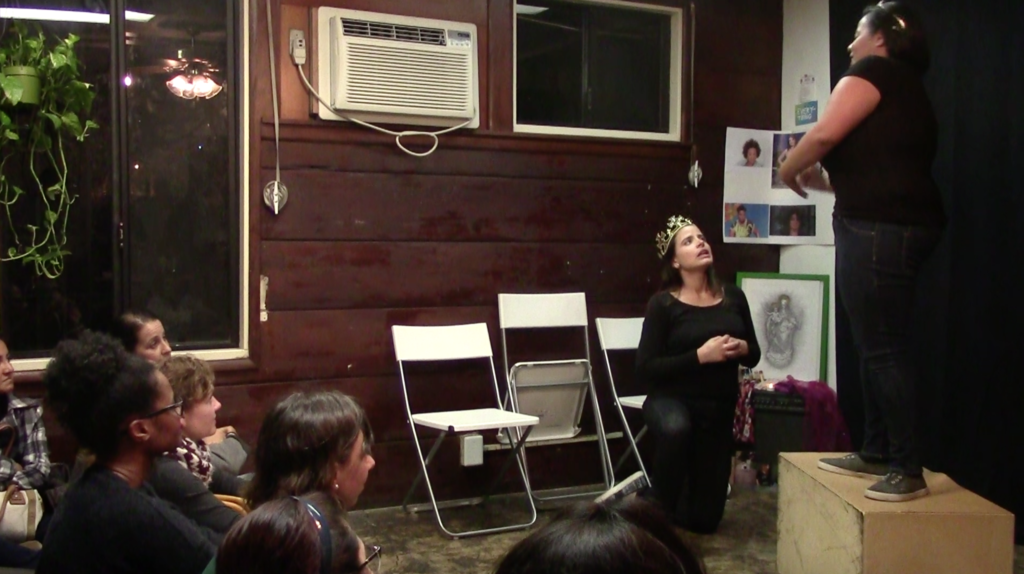
In this “Rapunzel”-inspired sketch, a man, played by a female performer, tries to coerce a princess from her tower by offering a life under the thumb of patriarchy. She kindly declines.
And I wouldn’t have found these women without Facebook or without email, without any of that stuff! We have such an incredible opportunity now to find people that previously would have been isolated with each other. And to collaborate in a way that previously would have been very difficult too.
If we didn’t have the Facebook and Google Drive and stuff like that, putting together a sketch group with so little time, it would have felt like so little resources—it would have felt overwhelming. But having that technology actually made it really easy. I couldn’t believe it!
And I even got to coordinate the whole show just with my iPhone on Bluetooth speakers. I got to make a playlist and every time I pressed play, every time I pressed stop, it was like a new sketch. So we didn’t have to fuss with the blackout, we didn’t have to fuss with the curtains, we can put on a sketch show anywhere we want, just from using my phone! It’s crazy.
MW: On a grand scale, if more shows keep happening like this, what kind of impact can it have for a female comedian?
RA: Shows like this don’t just have impact on female comedians—they have an impact on everybody who comes to see them.
As a matter of fact, there was a woman who came to the show that I didn’t recognize. She came up to me after the show and she said, “Hi, I’m a Latina, I’m just living in the neighborhood, and I saw your show just randomly and it really inspired me because I always wanted to do comedy and I never knew where to start. And just seeing that you guys could just go this space and put on a show really inspired me.”
So now she wants to connect, and I’m going to add her on Facebook, I’m going to add her to the Women of Color in Comedy group, and there she’s going to find the resources that she needs to start.
I really do think that when you get people writing and performing, and speaking on their experiences, and coming up with characters, you’re introducing people to your perspective—to your point of view and to your lived experience. And when you show people that, there just ends up being so much connection, so much more empathy. And I just think it’s beneficial across the board. Not just female comedians, it’s beneficial for everybody to see eye-to-eye with you.
I have friends in the audience out there who are, like, white dudes, and they saw it and they were like, ‘This is amazing! This is a sketch show unlike anything I’ve ever seen, because not only was I laughing, but I was like learning and laughing at the same time.’ And that’s awesome! I don’t think you can discount any of those “Schoolhouse Rock” moments like that.
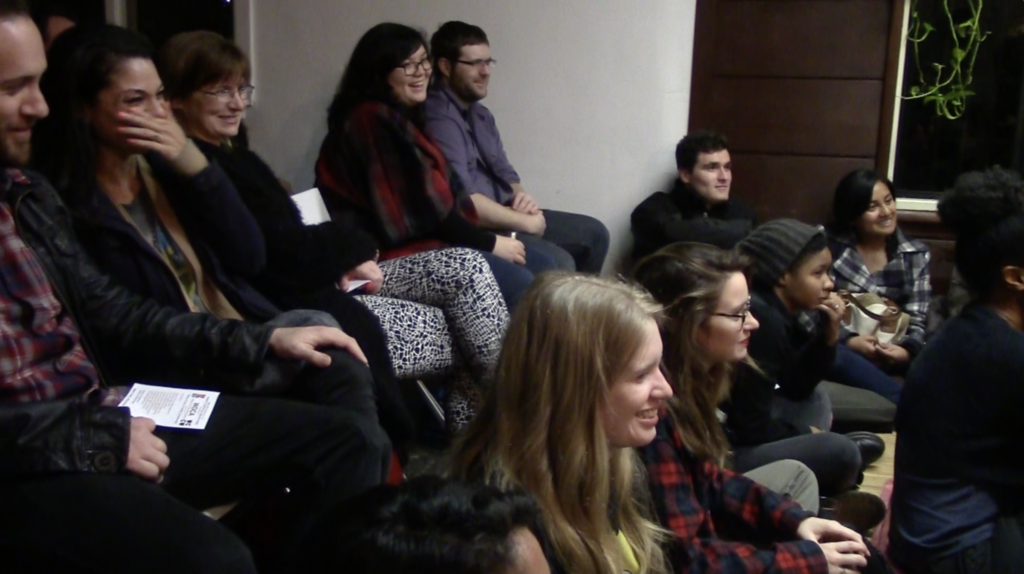
The “Women of Color in Comedy” showcase drew audience members from various walks of life.
MW: In regards to the comedy industry, have you experienced sexism or limitation in being a woman?
RA: Yeah, it has always felt like the environment has been hostile towards women, which is so weird because it’s just something that I always grew up idolizing. I grew up watching late-night comedy shows like Conan and Letterman. I dreamt about being a late-night host, I dreamt about being on SNL or something like that. But it’s like, you don’t even notice until you’re older, that like every single person on the front of that was like a white dude. And you end up automatically thinking of them as neutral because that’s what society presents to you as neutral.
You have, like, Jerry Lewis and Buddy Hackett and all the comedians of all time— they’re all white men! And if you like comedy and you like to laugh you instantly relate to them, you’re like, “Yeah that’s me I’m a comedian I’m like all these guys,” and there really reaches a point when you’re auditioning for things, or you’re trying to do stand-up or something, and all of a sudden there’s this jarring disconnect.
There comes this moment where you’re facing a crowd of hostile faces, or a casting director tells you something that’s like directly misogynist. Or you’re reading these breakdowns that are like so depressing—the casting breakdowns. They’re all asking for the most obscene things, which we parodied a little bit in our show.
MW: Can you give me an example of a casting breakdown right now?
RA: Oh my god, the casting breakdowns are like, “We’re looking for an actress who is age 18-20, she has to be a perfect 10, but we don’t want her to be skinny, but she has to be 36-24-36, and we want her to be like—she’s like a whore with a heart of gold,” and, “The hero’s gonna meet her and she’s gonna be his muse and she’s gonna come out of her dilapidated ghetto and, like, teach him the meaning of life.”
It’s just stupid. It’s just honestly stupid. You read these descriptions and you’re like this honestly describes, like, nobody. Like I would never describe a real human being the way this casting breakdown is describing them.
And it ends up being: 9 out of ten of the ones you read are exactly like that. Or like, “Must provide bikini picture,” or like, after the age of 25 the role just says, “Mom.”
And it’s just so stupid because then the guys get all these interesting, complex descriptions, like, “Oh, he’s haunted by his past, or he feels this internal struggle between justice and truth but he was raised a certain way.” And the women don’t get anything. That’s white women to begin with—and the women of color get like nothing. They get peanuts.
The women of color are the funniest women that I know. Women of color are the funniest people that I know. And it’s really weird that you don’t see them in the mainstream because in my reality, those are the funniest people. So we need to see them.
MW: One of the performers I was talking to earlier described this experience as being very therapeutic. Would you agree with that?
RA: Oh yeah. Every time we met for a rehearsal, it felt like group therapy. It felt like we had a lot to get off of our chest. So the funny thing is, like these sketches, they weren’t always funny, because there was just so much stuff that people just had to get off their chest.
People were like, ‘I’ve done 200 auditions in the past year reading for ‘Sexy Latina.’ It just gets to a point where it’s like, soul-crushing.
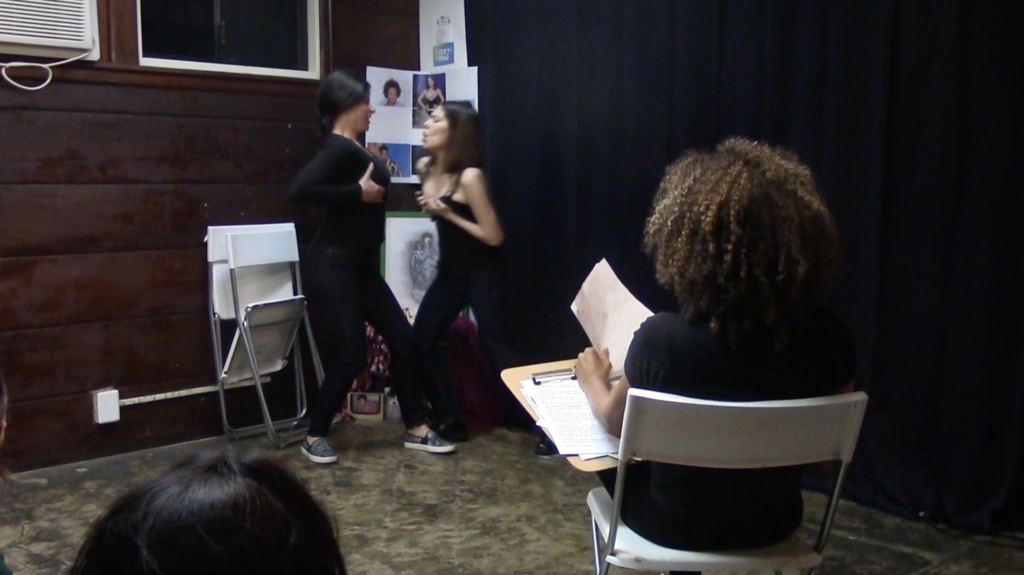
Two showcase performers satirize the Hollywood acting industry in a sketch where two women compete for the role of “Sexy Latina Twins.”
But, in my experience, the worst stuff, the best comedy comes out of it! Which, again, I think women of color are the funniest people I know because they get so much sh*t all the time, and what else are you gonna do but laugh about it?
MW: Yeah! So because they face more aversion, they have more content?
Yeah! I mean, when you hear the average white dude’s stand-up set—it sounds like, insipid, because he’s like “Oh, I can’t get a date, dah dah dah.” The stuff that they complain about makes no sense compared to the lived realities of everybody else.
RA: If it ever becomes an equal playing field, what kind of impact could that have?
Honestly, it’s empowering, because when you see yourself reflected in the mainstream culture, in a real, respectful way, in a multi-dimensional way, it does so much for you as a person. You don’t end up having to relate to that endless stream of white guys, where it’s like, “Yeah that’s like me! That’s like me!” and disassociating yourself from your own body and your own experience.